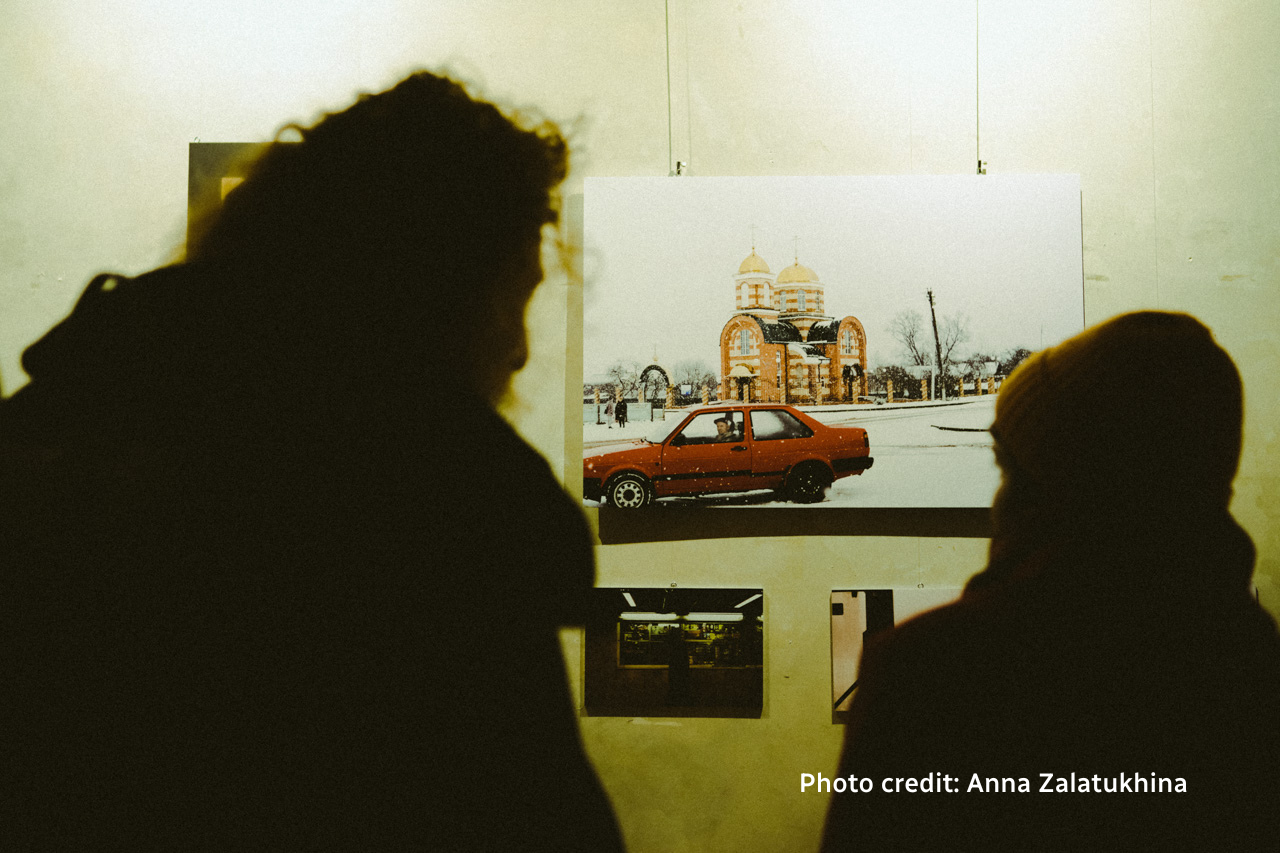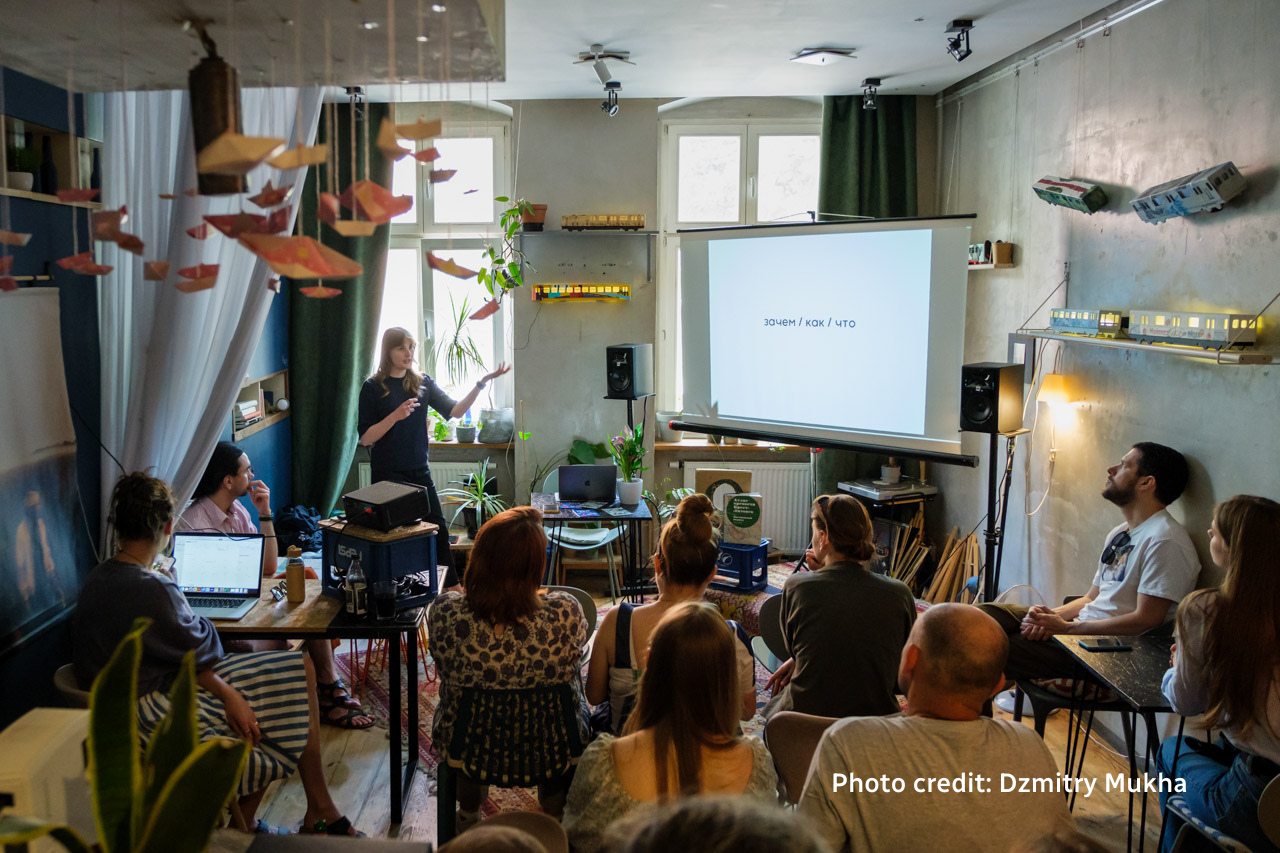How a Belarusian Bar in Poznań Became a Community Hub
An artist from Brest got tired of working in three jobs and left Belarus. She settled in Poland and created a cultural foundation that has grown into a center of Belarusian culture.
“Your space is the embassy of culture of Belarus.”
“My home was in a typical apartment block on Arlouskaya Street in Brest. It represents Belarus for me, even if the building looks the same as in Poland or Germany and doesn’t have anything typically Belarusian in its appearance”, says the artist and cultural manager Volha Stryzhniova. “I would still dedicate poems to it because it is my home, where my mother lives and bakes the best pancakes”.
In Brest, she got by with three jobs at once: journalism, leading a children’s club, and teaching runway walking at a modeling school. In 2019, she left it all and moved to Poznań in Poland. “I think the lack of money and self-realization made me tired. Emotionally, I felt drained, and someone told me that it could be easier to live abroad... Or maybe I just had to move to another city”, she says.
Shortly before the COVID-19 pandemic, Stryzhniova and a friend rented premises and, in August 2020, they opened the My (“us” in English) Bar. Being the only staff, they handled everything, from serving customers to organizing workshops.
“Before 2020, we didn’t plan to transform it into a space for foreigners, but we realized it was needed”, she explains. “People arriving from Belarus looked frightened by the new city. They were discussing at the bar where they lived, what common friends they have”.
Then, in the early days of the 2020 uprising in Stryzhniova’s native country, the My Bar duo organized a photo exhibition about the protests and added national dishes to the menu.
Around the same time, Stryzhniova noticed that she was burned out after two years of working at the bar. So, she left it to create a new cultural foundation named Kut (homeland).
“Now the Polish say it’s up to us when it comes to Belarusian culture in the city”, she says. “To be exact, the owner of our premises thinks so. He is a Polish anarchist who opened all the famous squats in Poznań and visited Belarus several times. He said ‘Why didn’t you put up a sign that your space is the embassy of culture of Belarus?”
 Belarusians, Poles, and Ukrainians Get to Know Each Other
Belarusians, Poles, and Ukrainians Get to Know Each Other
“My Polish friend told me about the My Bar when I just moved to Poland and knew no one. So, I immediately remembered the name and address and went there. My first thought was that I would find a family here”, Georgy Minets recalls. He came from Belarus in 2022, and he frequently visits the venue and is friends with its managers.
"When I go to the bar, I often come across new people or someone I’ve seen before”, says another regular, Alena, a graphic artist and actress who has been living in Poznań for nine years. She says that until 2020 there was no Belarusian cultural life in the city, but now the My Bar and Kut have become one of its points of interest.
“Kut very organically creates a space where everybody can integrate regardless of origin—Belarusian, Polish, and Ukrainian people”, according to Alena. She explains that the community includes people of all ages and with different interests. The night community consists of students and young people who are interested in parties. The daytime community of people attending lectures and classes together with their children.
“The events that bring two communities together are the best features of the bar”, Alena says. “These include lectures or meetings with artists, vernissages, and classes in the Belarusian language.”

“I Would Like To Involve Professionals.”
Kut’s space also hosts concerts, masterclasses, performances, and open-mic poetry sessions. The guest list includes many well-known Belarusians, such as the children’s programs presenter Malyavanych, the musician Sveta Ben, and the historian Uladzimir Arlou.
Stryzhniova stresses the importance of horizontal connections. “People often agree to go to another city because, together with a speech or lecture, they will also have some interesting conversations before and after it”.
“Such meetings with a horizontal dialogue provide an opportunity to connect, look into each other’s eyes, and offer our own way to participate”, says Natalia Zdanevich, who has been working in Belarus and abroad with civil society organizations for ten years as a producer of social and cultural projects. “We expected to be leaving Belarus for a short time, but it extends further and further. We mimic what we experience in new countries and cities. Therefore, it is very important for us to preserve our self and identity patterns, the boundaries of which are now blurring slowly”. Zdanevich believes that Kut’s space is becoming more professional.
Kut supports Belarusians by inviting those who highlight the quality of Belarusian culture through their skills. “Hiding uninteresting matters behind a Belarusian word—that’s not for me. ‘No matter what as long as it’s Belarusian’—that’s not what we are about”, Stryzhniova says.
She adds that culture should be engaging and contemporary. “Passion and pain are evident in some compositions. Now, in 2023, this is much more useful than the speeches of those who spread the classic image of Belarus, which was relevant a century ago”.
Kut offers those it supports the tools to work professionally and to present attractively their cultural initiatives in local communities and in the media. For instance, Zdanevich has held several lectures on cultural management for local initiatives, activists, and cultural managers.

“Without the My Bar, I Wouldn’t Have Anything.”
Since January 2023, Kut and My Bar have organized and hosted over 50 events. Altogether nearly 1,000 people attended, which makes up the vast part of the Belarusian community in Poznań. Its local chat on Telegram includes around 4,000 people in the city.
“It seems to me that this bar and foundation have a promising future”, according to Zdanevich. Stryzhniova provides high-quality management and fosters open communication. The team is ready for experiments”. The team of Kut and My Bar now consists of five people, with Stryzhniova primarily responsible for event management.
Sometimes the authors of individual projects approach the team and they work together. For example, Volha Arkhipava, a former employee of the National Art Museum in Belarus, and Aliaksei Luniou, an artist from Minsk, created the cultural club I-DZIE-JA (“idea” in English but with a play on Belarusian words that means also “And where am I?”).
Minets, along with Stryzhniova and a friend, sometimes arranges events related to the Belarusian language and Belarusian history, including, for example, conversational games. He says that his connections in the Belarusian community also helped him to co-create the Praliu clothing brand.
“Without the My Bar, I wouldn’t have the opportunity to do what I am doing now. All acquaintances, all activities, all significant events either happened thanks to the bar or were a consequence of my visits. Perhaps without the bar, I wouldn’t have been able to get used to Poland”, he says.